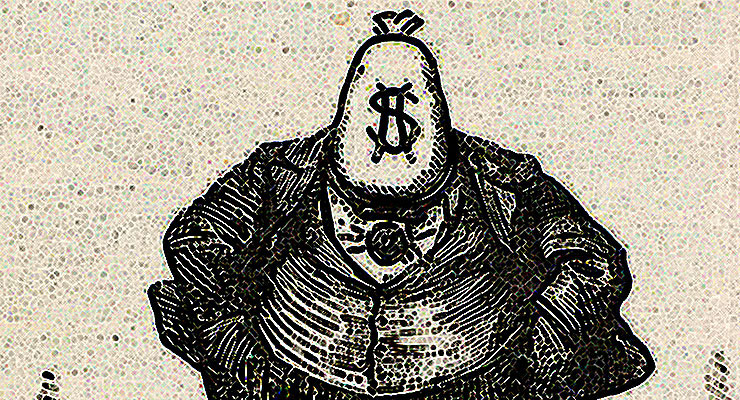
When we are poor, we have hopes and dreams. They inspire us and they give purpose to our lives. Our joy is more in the striving than in the accomplishment. We all know the stereotype of the ‘starving artist’. It may be a stereotype, but there’s a grain of truth behind it.
It is the ability to create that brings joy. It’s the creation that’s the reward. Although its an annual battle and the work is hard, there is great pleasure in a good crop of beans, or corn, or wheat. When they’re harvested, we have a sense of accomplishment and the comfort of a period of security.
When we become affluent, our car – which was once a means of conveyance – becomes a symbol of our status. Our house becomes a badge of our success. Our lives come to be marked by the number of badges we exhibit. Our work, which was once a source of occasional frustration and frequent joy becomes drudgery, endured for the sake of showing more badges.
There has to be a reason why The Great Depression, a period of pervasive poverty, was marked by such upbeat songs as George Gershwin’s “I Got Plenty o’ Nuttin'”:
I got plenty of nothing
And nothing’s plenty for me
I got no car – got no mule
I got no misery
Folks with plenty of plenty
They’ve got a lock on the door
Afraid somebody’s going to rob ’em
While there out (a) making more – what for
I got no lock on the door – that’s no way to be
They can steal the rug from the floor – that’s OK with me
‘Cause the things that I prize – like the stars in the skies – are all free
Another great example is “Ain’t We Got Fun?”, a song with lyrics written in 1920 by Raymond B. Egan and Gus Kahn:
Every morning, every evening
Ain’t we got fun
Not much money, Oh but honey
Ain’t we got fun
The rent’s unpaid dear
We haven’t a bus
But smiles were made dear
For people like us
You may not be able to appreciate those lyrics without their melodies that still ring in my mind, but maybe, if you can imagine being out of work with no hope of getting a job, often dependent on the largesse of friends and relatives just to survive, you might get a glimmer. The point is, we humans have an ability to accept what is and make the best of it – and that ability is the springboard from which other myths can be launched.
The relationships that underlie human happiness are so deep, so complex that it’s difficult to get a handle on them. The music of the Depression years was inspirational. The war generated its own kind of music, some martial, some nationalistic, some the blues of loneliness. In the period after the war, the music slowly took on a different tone. It lost its suggestion of personal joy. As our circumstances improved, we found that acquisition seemed important. Individuals bought homes and cars, and used them to show how successful they were. But not everyone could “keep up with the Jones” and, for them, unhappiness ensued.
At the same time, the rapid growth and spread of communication media fostered the mushrooming of marketing, which, in the ensuing 50 years, was able to completely divorce price from cost. This phenomenon feasted on the growing acquisitiveness. Sneakers, which once cost less than a dollar, sold for prices well over $100.00 per pair.
The Great Depression spawned the Swing era, which was decidedly upbeat. People with nothing found joy in hope. Could their music suggest that affluence has an adverse effect? No, that’s too simplistic, but somewhere in there lays the germ of an important idea.
Somewhere in the midst of all this bustle and noise, we may be getting a clue that affluence is not the answer, but what can we learn from our experiences? How can we use our knowledge to create a better society. That may be a question worth pursuing.
If you think about your acquaintances and friends, you’ll find the influence of a manipulative media has created innumerable tentacles of habit and belief that have a firm grip on their minds. They have, for example, a firm belief that their political system is democratic, yet the only way they can participate in it is by choosing from options offered them by a small group of elites.
Academics are slowly coming to realize that the United States is more an oligarchy than a democracy, but it will take time to loosen the grip of the democracy myth on the people. While, once, it was to our personal advantage to turn a blind eye to our own poverty, we must learn that it’s not wise to blind ourselves to our status as subjects of the elites that control our government.
Leave a Reply